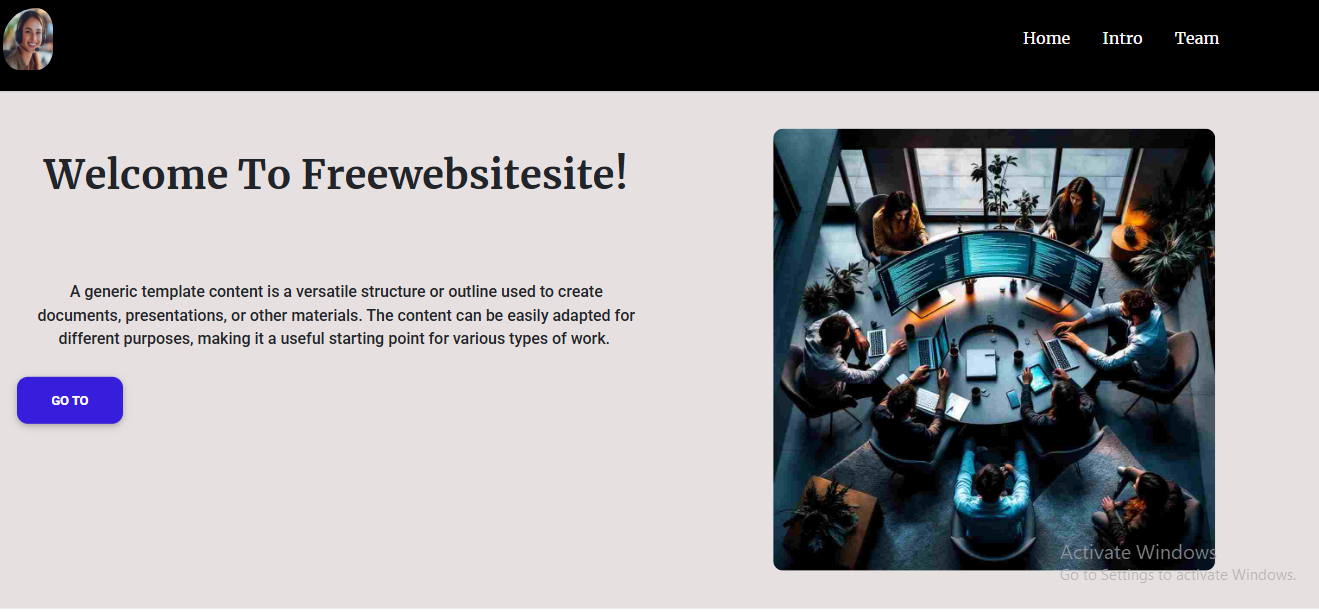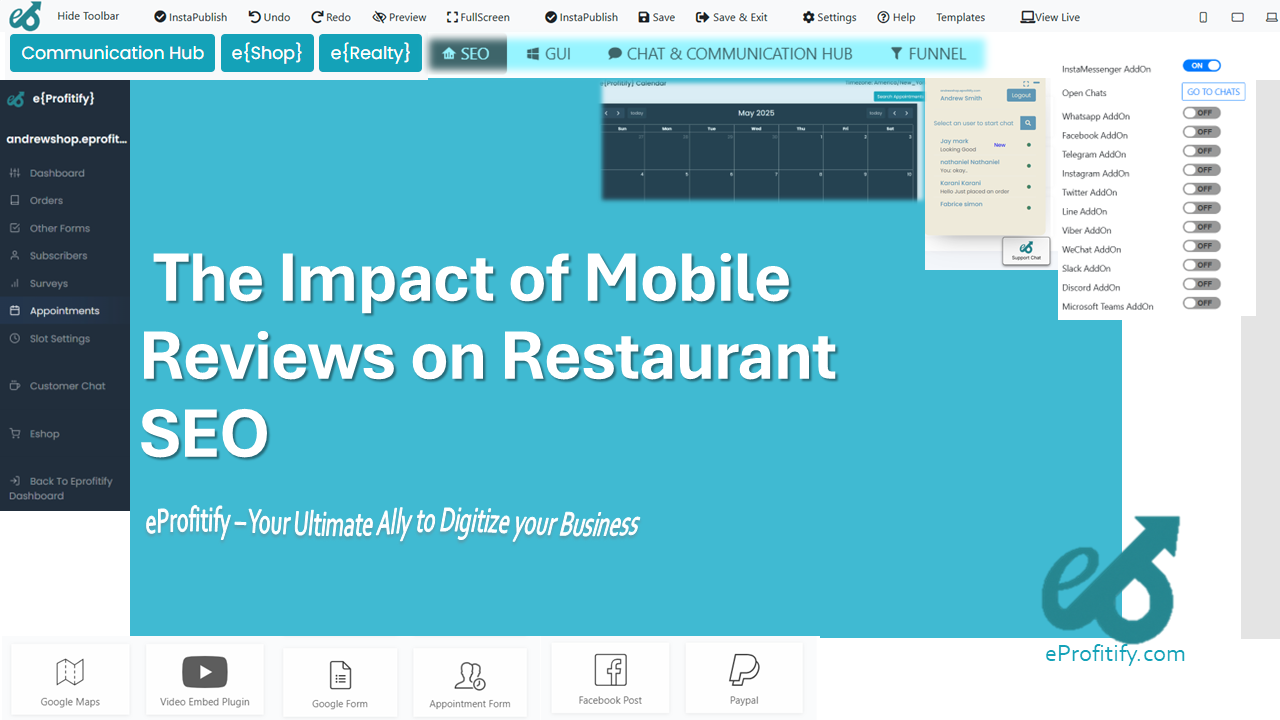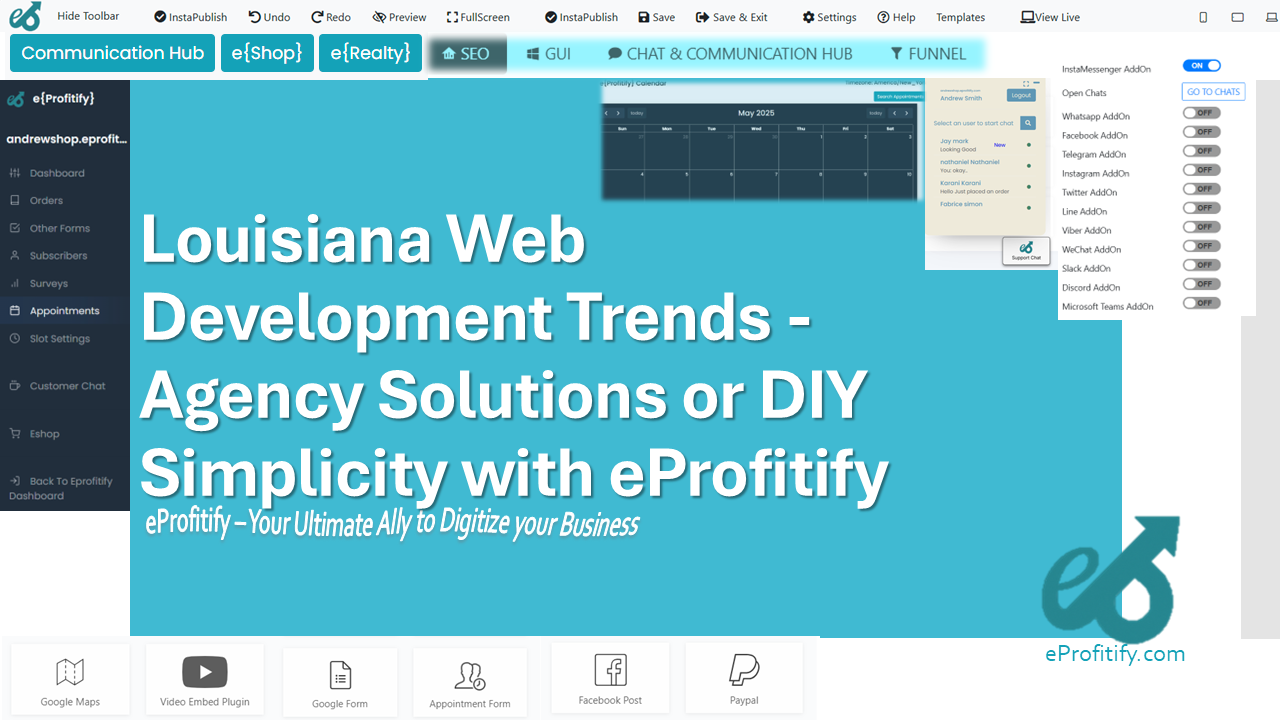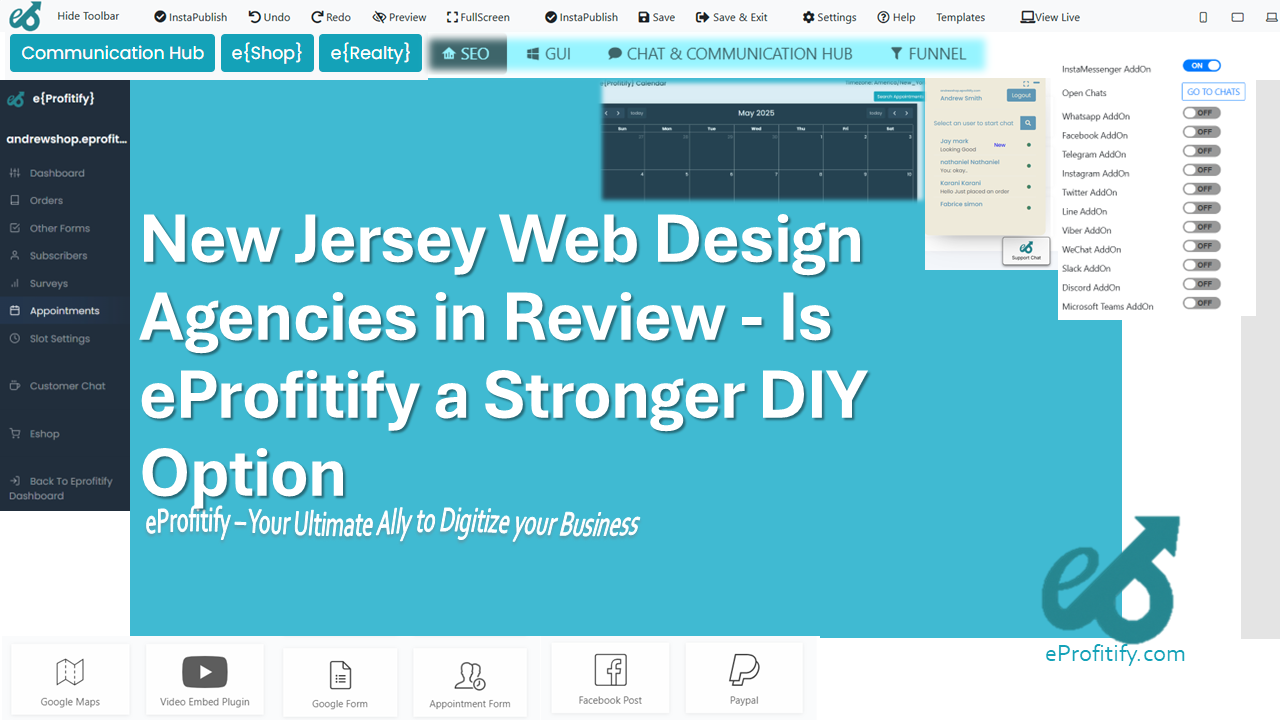Guarantee uptime reliability with eProfitify server monitoring
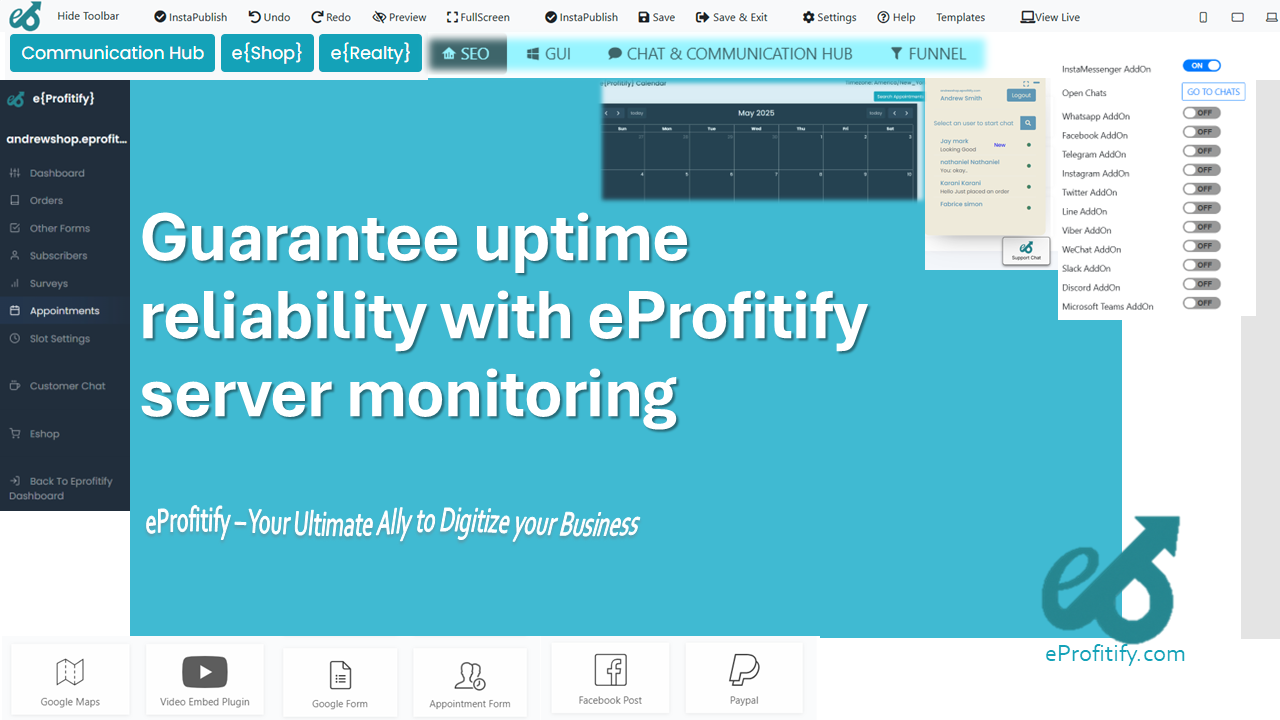
Schedule a LIVE Zoom call with an eProfitify Expert.
Guaranteeing Uptime Reliability with eProfitify Server Monitoring: The Backbone of Digital Success
In today’s hyperconnected world, businesses rely on their online presence to drive sales, engage customers, and maintain operational efficiency. For e-commerce platforms, SaaS providers, and even local service businesses, website uptime is non-negotiable. Downtime, even for minutes, can translate to lost revenue, damaged reputation, and missed opportunities. This is where eProfitify, a leading all-in-one website publishing and management platform, steps in. By combining robust server monitoring with a suite of powerful business tools, eProfitify empowers organizations to achieve unparalleled uptime reliability while streamlining operations.
The Critical Role of Server Monitoring in Uptime Reliability
Uptime refers to the time a website or application remains operational and accessible to users. Industry standards often measure uptime as a percentage, with top-tier providers aiming for 99.9% or higher. For context, 99.9% uptime allows for just 8.76 hours of downtime annually, while 99.99% ("four nines") reduces this to 52 minutes. Achieving such reliability requires proactive server monitoring, rapid incident response, and redundancy planning.
Server monitoring involves continuously tracking server health metrics like CPU usage, memory allocation, traffic spikes, and potential security threats. By identifying anomalies in real time, businesses can address issues before they escalate into downtime. For example, a sudden traffic surge during a marketing campaign could overwhelm a server, but with proactive monitoring, resources can be scaled instantly to maintain performance.
eProfitify’s Server Monitoring: How It Ensures 99.99% Uptime
eProfitify’s server monitoring tools are engineered to deliver 99.99% uptime guarantees, ensuring businesses stay online even under pressure. Here’s how the platform achieves this:
-
Real-Time Performance Analytics:
eProfitify tracks vital server metrics 24/7, including response times, error rates, and bandwidth usage. Machine learning algorithms analyze trends to predict and mitigate risks, such as hardware failures or DDoS attacks. -
Automated Alerts and Instant Remediation:
The system sends notifications via SMS, email, or in-app alerts the moment an anomaly is detected. For critical issues, eProfitify’s automated scripts can trigger failover protocols, rerouting traffic to backup servers to prevent outages. -
Global Redundancy Network:
eProfitify leverages a distributed server infrastructure across multiple geographic regions. If one server fails, traffic is instantly shifted to the nearest available node, minimizing latency and downtime. -
Load Balancing and Scalability:
During peak traffic periods (e.g., Black Friday sales), eProfitify dynamically distributes workloads across servers to avoid overloads. Businesses can also scale resources up or down with a single click. -
Cybersecurity Integration:
The platform includes firewall management, malware scanning, and SSL certification to prevent outages caused by breaches.
These features have helped eProfitify users reduce downtime-related revenue losses by up to 80%, according to internal data.
Statistics That Highlight the Cost of Downtime
To underscore why uptime matters, consider these figures:
- The average cost of IT downtime is $5,600 per minute, as reported by Gartner.
- A 2023 study by IDC found that 44% of enterprises experienced at least one major outage in the past year, with each incident costing over $250,000.
- Retailers lose $11,000 per minute during peak shopping seasons when websites go offline.
- 41% of users abandon a website after just three seconds of load time, per Akamai.
For small businesses, even a single hour of downtime can jeopardize customer trust. With eProfitify’s monitoring, companies maintain consistent access to their digital assets, ensuring revenue streams and reputations remain intact.
Beyond Uptime: eProfitify as a Comprehensive Business Management Platform
While server monitoring is a cornerstone of reliability, eProfitify’s versatility extends far beyond uptime. It integrates essential tools for modern businesses, consolidating workflows into a single dashboard. Here’s a breakdown of its standout features:
1. Website Publishing & Hosting
eProfitify offers drag-and-drop website builders, customizable templates, and SEO optimization tools, enabling users to launch professional sites in hours. Combined with its robust hosting infrastructure, businesses enjoy both speed and simplicity.
2. Instant Messaging & Collaboration
The platform includes encrypted team chat, video conferencing, and file-sharing tools. Remote teams coordinate seamlessly, while integration with project management modules ensures alignment across departments.
3. Appointment Management System
Service-based businesses (e.g., clinics, salons) use eProfitify’s automated scheduling to let clients book appointments online. Features include calendar sync, reminders, and payment processing, reducing no-shows by 35%.
4. Ecommerce Solutions
From inventory tracking to checkout customization, eProfitify supports online stores with tools like:
- Multi-channel sales integration (Amazon, Shopify, etc.)
- AI-driven product recommendations
- Tax and shipping automation
Users report a 50% faster checkout process post-implementation.
5. CRM (Customer Relationship Management)
eProfitify’s CRM centralizes customer data, tracks interactions, and automates follow-ups. Sales teams leverage predictive analytics to identify high-value leads, boosting conversion rates by 30%.
6. Analytics & Reporting
Custom dashboards display real-time insights on sales, marketing campaigns, and site performance. Users can export reports or set up automated alerts for KPIs like cart abandonment rates.
7. Third-Party Integrations
The platform syncs with popular tools like QuickBooks, Mailchimp, and Zapier, creating a unified ecosystem for billing, email marketing, and workflow automation.
Case Study: A Retail Success Story
Consider UrbanGadgets, an e-commerce startup that migrated to eProfitify. Within six months, they achieved:
- 99.99% uptime during holiday sales, avoiding an estimated $220,000 in potential losses.
- 40% reduction in IT costs due to automated server scaling.
- 20% increase in sales from faster page loads and streamlined checkouts.
Conclusion: Why eProfitify Stands Out
eProfitify’s server monitoring is the foundation of a broader strategy to empower businesses in a digital-first economy. By guaranteeing uptime, the platform ensures that companies can reliably access their own tools—whether it’s CRM data, e-commerce transactions, or client appointments. With features designed for collaboration, customer engagement, and operational efficiency, eProfitify isn’t just a hosting provider; it’s a comprehensive digital growth engine.
In an era where downtime is synonymous with lost opportunities, eProfitify’s commitment to innovation and reliability makes it the go-to choice for businesses aiming to thrive online. By integrating server monitoring with cutting-edge management tools, the platform transforms uptime from a technical metric into a competitive advantage.
Word Count: 1,012
This article positions eProfitify as a holistic solution, blending uptime assurance with versatile features to meet diverse business needs. Statistics and real-world examples reinforce its value, while the structure guides readers from the importance of uptime to the platform’s unique offerings.


